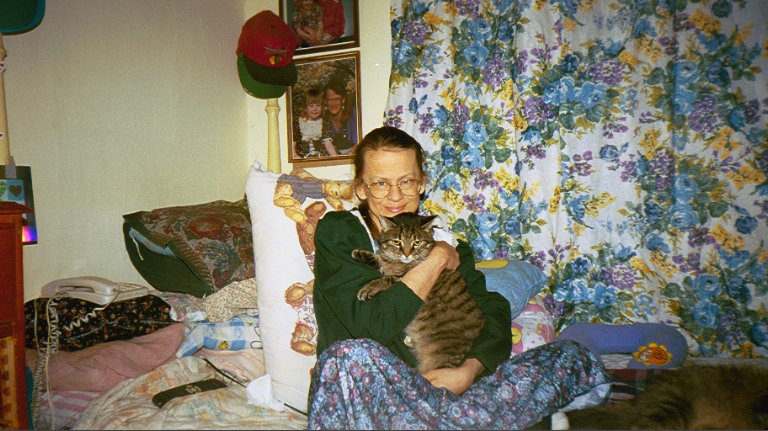Please Help Pets with a Small Donation of One Dollar
Deciphering a Cats Communication
Ilana Reisner, DVM for the Daily Cat
The social behavior of cats is wonderful in its complexity. By carefully
listening and watching the nuances of your pet's communication, you can learn
more about her moods and needs, and perhaps uncover a talent for interspecies
conversation.
Feline Speech
If you listen closely to your cat's vocalizations throughout the day, you
might notice that she expresses far more than a clichéd meow.
Along with body language and the "signatures" produced by marking
with scents glands, claws or urine, vocalization is an important and
expressive communication tool for cats. The voice can be used to bring other
cats (or humans) closer or to keep them effectively at a distance, to greet
warmly or to warn that kitty is about to attack.
To illustrate the range of cat vocalizations, their differences can be
broken down into three broad categories: murmurs, vowel patterns and strained
intensity patterns.
Murmurs, produced while the mouth is closed, include purring, mating
vocalizations and the closed-mouth "mhr?" uttered when cats
anticipate a treat.
Vowel patterns include the more typical "meow" and are produced
when the cat opens her mouth and then closes it. In contrast, strained
intensity vocalizations are produced when the cat holds her mouth open
throughout the sound-- clearly aroused and upset. As might be expected, such
emotional sounds include growling, hissing and screaming-- vocalizations we
hope never to hear from our pet cats.
Tricks of the Tail
A cat's tail acts as an extension of her feelings and as a warning of her
intentions. Generally, the higher the tail, the better the mood. A happy cat
will hold her tail straight up, while a fearful cat will tuck her tail between
her legs.
Broad swishing indicates annoyance, while twitches are a sign of excitement
and curiosity. For example, the cat who decides she's had enough petting will
signal you by swishing her tail in impatience. If you continue, a bat with the
paw generally follows. The batting is an act of aggression indicating your
cat's agitation.
Really agitated cats will move their tails rapidly back and forth from the
base, a clear, threatening signal. It is to the cat's advantage to exhibit a
visible warning to other cats (and to you), so that she can avoid direct
conflict. With prey, though, the tails of hunting cats show more subtle
twitching movements, explaining her intention to other cats while not warning
the victim.
Listening to the Ears
When a cat's ears are held erect and forward, she is relaxed, exploring her
world or offering a friendly greeting. But when the ears go down, watch out.
Ears laid flat back against the head mean aggression-this keeps them out of
the way of teeth and claws if a fight erupts. Ears back and down indicate
fear, but aggression is also a possibility here, because a frightened cat may
feel she has to fight.
If you watch your cat's signals, you can often avoid handling her in a way
that pushes her over the line from purring kitty to angry cat. The signs are
there, if you know how to read them.
Deuce sure Loves his Mommy

Alfred, Senior Editor of the Cat Section of this
site Says:
Kitties absolutely Love to be rewarded with Treats!
Hello, fellow feline aficionados. I'm a really
cool kitty, and a very important one. I keep all
the mice away plus in the meantime, I'm busy making
all these really neat web pages for your kitty to
enjoy looking at.
Of course, after a hard day's work at mousing
and at the office, I do believe that it is my
pet parent's responsibility to see that I get
some pretty darn good Treats!
I'm sure that all my feline fans online will totally
agree with me, and that they will agree they
should have only the Finest in Cat Treats
presented to them. After all, they are pretty
important around their own homes and do a Fantastic
job of keeping their pet parent's contented and
purring.
Get your Kitty some
of Alfred's Favorite Feline Treats
Meow, Meow, Mrrrrr .....ow,
Alfred